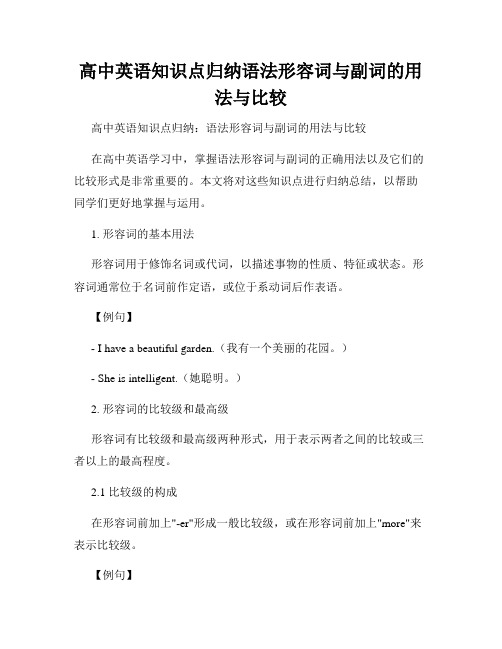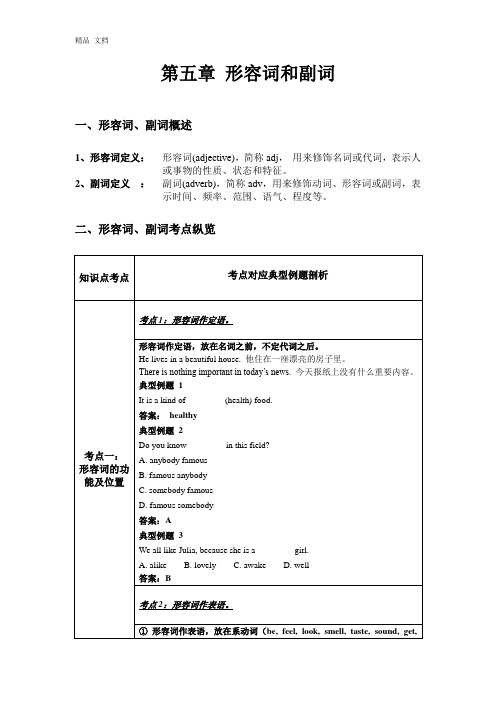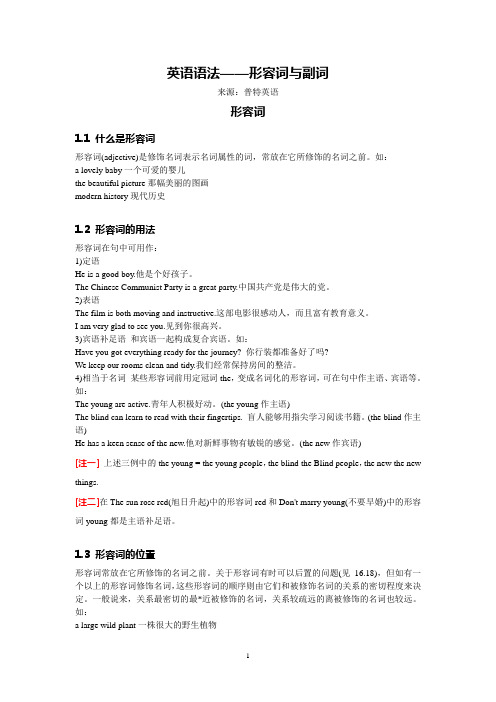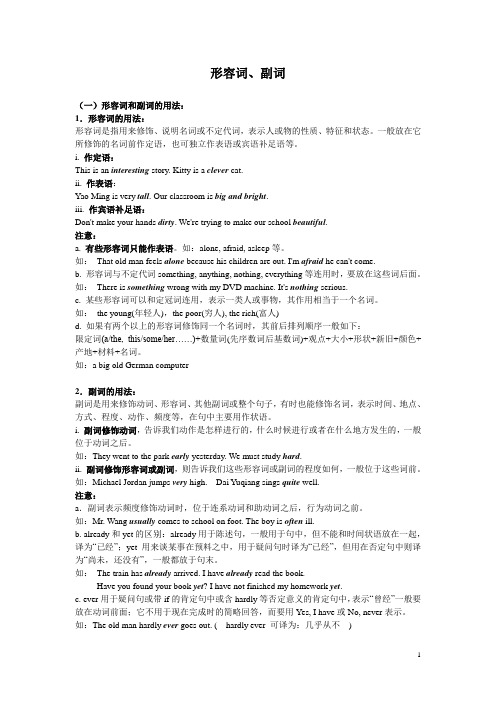英语语法大攻克--形容词与副词总结
高中英语知识点归纳语法形容词与副词的用法与比较

高中英语知识点归纳语法形容词与副词的用法与比较高中英语知识点归纳:语法形容词与副词的用法与比较在高中英语学习中,掌握语法形容词与副词的正确用法以及它们的比较形式是非常重要的。
本文将对这些知识点进行归纳总结,以帮助同学们更好地掌握与运用。
1. 形容词的基本用法形容词用于修饰名词或代词,以描述事物的性质、特征或状态。
形容词通常位于名词前作定语,或位于系动词后作表语。
【例句】- I have a beautiful garden.(我有一个美丽的花园。
)- She is intelligent.(她聪明。
)2. 形容词的比较级和最高级形容词有比较级和最高级两种形式,用于表示两者之间的比较或三者以上的最高程度。
2.1 比较级的构成在形容词前加上"-er"形成一般比较级,或在形容词前加上"more"来表示比较级。
【例句】- She is taller than me.(她比我高。
)- He is more intelligent than his brother.(他比他的弟弟更聪明。
)2.2 最高级的构成在形容词前加上"-est"形成一般最高级,或在形容词前加上"most"来表示最高级。
【例句】- She is the tallest girl in the class.(她是班级里最高的女孩。
)- This is the most interesting book I've ever read.(这是我读过的最有趣的书。
)3. 副词的基本用法副词用于修饰动词、形容词、副词或整个句子,以表示时间、地点、程度、方式等。
【例句】- He speaks English fluently.(他英语讲得很流利。
)- They arrived late for the meeting.(他们开会迟到了。
)4. 形容词和副词的区别形容词和副词在构成上没有本质区别,但在用法上有一些不同之处。
英语语法大攻克--形容词与副词总结

形容词与副词一、概念:形容词用来修饰名词或代词, 表示人或事物的性质, 状态,和特征的程度好坏等等。
▲使用形容词时的注意事项:a)有关国家和民族的形容词加上定冠词指这个民族的整体,与动词的复数连用。
the British,the English,the French,the Chinese.b)多个形容词修饰名词的顺序:限定词--数词--描绘词--(大小,长短,形状,新旧,颜色) --出处--材料性质,类别--名词副词是一种用来修饰动词,形容词,副词或全句的词,说明时间,地点,程度,方式等概念;包括副词的种类有频度副词、方式副词、地点副词及时间副词等。
▲使用副词时的注意事项:a) 副词的位置:在动词之前。
在be动词、助动词之后。
多个助动词时,副词一般放在第一个助动词后。
(大多数方式副词位于句尾,但宾语过长,副词可以提前,以使句子平衡。
方式副词well,badly、,hard等只放在句尾。
b) 副词的排列顺序:时间,地点副词,小单位的在前,大单位在后。
方式副词,短的在前,长的在后,并用and或but等连词连接。
多个不同副词排列:程度+地点+方式+时间副词。
c) 副词very 可以修饰形容词,但不能修饰动词。
副词enough要放在形容词的后面,形容词enough放在名词前后都可。
特例:动词一般用副词来修饰,但是在系动词后一般用形容词作表语。
常见的系动词:look(看起来), sound(听起来), smell(闻起来), taste(尝起来), get(变得…), become(变成), grow(长成), turn(转变成), go(变), come(成为),在这类词后一般用形容词做表语.例:1、Let’s enjoy the song yesterday once more. It sounds .A.wellB. sadlyC. niceD. bad2、Jone looks so today because she has got an “A” in her maths test.A. happyB. happilyC.angryD. angrily答案:1.C 2.A二、形容词变为副词的规则:1、在形容词词尾直接加“ly”,如:real—really, helpful—helpfully,careful—carefully;2、以辅音字母加y结尾的形容词要变y为i,再加-ly,如:busy—busily, angry—angrily;3、某些以辅音字母加不发音的e结尾和以-ue结尾的形容词要先去掉e,然后再加-y或-ly,如:terrible—terribly, true—truly, gentle—gently,possible—possibly;注意:nice—nicely, wise—wisely, polite—politely 除外。
初一英语形容词和副词语法知识总结(讲解+考点+综合练习):形容词和副词

第五章形容词和副词一、形容词、副词概述1、形容词定义:形容词(adjective),简称adj,用来修饰名词或代词,表示人或事物的性质、状态和特征。
2、副词定义:副词(adverb),简称adv,用来修饰动词、形容词或副词,表示时间、频率、范围、语气、程度等。
二、形容词、副词考点纵览三、综合练习( )1. –If you don’t like the red coat, how about the green one?–OK, but do you have _______ size in green? This one is a bit small for me.A. a bigB. a biggerC. the bigD. the bigger( )2. –Mum, I think I’m _______ to get back to school.–Not really, my dear. You’d better stay at home for anoth er day or two.A. so wellB. so goodC. well enoughD. good enough ( )3. –What delicious cakes! –They will taste _______ with butter.A. goodB. betterC. badD. worse( )4. –Mr. Zhou , of all the students in our group, who lives _______ ?–I think Li Lei does.A. farB. fartherC. farthestD. the farther( )5. With a history of more than 1,400 years, ZhaoZhou Bridge is the _______ stone arch bridge in the world .A. oldB. olderC. oldestD. elder( )6. Bob never does him homework _______ Mary. He makes lots of mistakes.A. so careful asB. as carefully asC. carefully asD. as careful as ( )7. A: How can I speak English _______ you?B: You’d better speak more, I think.A. as good asB. more thanC. as well asD. as much as( )8. Your English is good. I’ll try my best to speak it as _______you do.A. clearly asB. clear asC. clearer thanD. more clearly ( )9. –Is your mother badly ill?–No, _______ , only a little cold.A. serious anythingB. serious nothingC. nothing seriousD. anything serious( )10. I’m not sure if I’m going to Tim’s party; I may go to the concert _______ .A. onlyB. insteadC. earlyD. late( )11. Although they are brothers, they are the _______ opposite of one another.A. veryB. justC. fewD. little( )12. The new Bright Restaurant is _______ than the old one. Moore and more people like to eat there.A. goodB. betterC. badD. worse( )13. Wang Ping does _______ in physics that I missed the first class.A. badlyB. Most badlyC. worseD. worst( )14. I got up so _______ this morning that I missed the first class.A. earlyB. lateC. quietlyD. neatly( )15. –Do you enjoy traveling by plane?–No. It’s _______ expensive.A. much moreB. more muchC. too muchD. much too( )16. I’m afraid the headmaster is _______ busy to meet the visitors.A. too muchB. much tooC. so muchD. much too( )17. How beautifully she sings! I’ve never heard _______ .A. the better voiceB. a good voiceC. the best voiceD. a better voice( )18. You do well in your lessons. I’m _______ you will pass the exam.A. sureB. afraidC. sadD. sorry( )19. –Who is _______ in your class?–Fred.A. tallB. tallerC. tallestD. the tallest( )20. –What do you think of the football match?–Wonderful! The Chinese football team has never played _______ .A. betterB. bestC. worseD. worst( )21. The population of China is _____ than _____ of any other country in the world.A. larger , the oneB. more , thatC. larger , thatD. more , the one ( )22. There is much wine here, but _______ people want to drink it.A. manyB. a littleC. fewD. a few( )23. People speak ______ of the film Not One Less. It is really necessary for every child to go to school.A. loudB. loudlyC. highD. highly( )24. She always finishes her homework on time. She ______ leaves it for tomorrow.A. alwaysB. neverC. usuallyD. sometimes( )25. The football match was _______, so the boys were _______ about it.A. excited , excitingB. exciting, excitedC. excited , excitedD. exciting , exciting( )26. Playing table tennis isn’t difficult. You can learn it _______.A. easyB. easilyC. quickD. hardly( )27. We Chinese always put our family name _______.A. lastB. nearlyC. firstD. in the middle ( )28. This kind of T-shirt look _______ and sells _______ in the market.A. nice, goodB. well , wellC. nice , wellD. good , nice( )29. The light in the room wasn’t _______ for me to read.A. brightly enoughB. enough brightlyC. enough brightD. bright enough( )30. –Look, this digital camera is really cheap! It’s only five hundred yuan.–The _______ , the better. I’m short _______ money, you know.A. cheaper , ofB. cheap, forC. expensive , ofD. more expensive , for( )31. Which subject do you like _______ , math, Chinese or English?A. betterB. bestC. wellD. very much( )32. _______ little water is not enough for _______ many people.A. Such , soB. So , soC. Such , suchD. So , such( )33. English is spoken by _______ people.A. a lotB. much manyC. a large number ofD. a great deal of ( )34. –Isn’t that Mary?–Yes, she always has a(an) _______ smile on her face.A. aloneB. kindlyC. ownD. friendly( )35. –Do you prefer music to drawing?–No. I like drawing _______.A. wellB. mostC. betterD. best( )36. Since China has been a member of the WTO, English is ______ useful than before.A. moreB. mostC. muchD. very( )37. Can you speak a little louder? I can _______ hear you.A. hardB. reallyC. hardlyD. clearly( )38. China has a _______ population and long history.A. manyB. largeC. muchD. big( )39. Do you have _______ to say?A. important anythingB. anything importantC. important somethingD. something important( )40. Which is _______ , English or Chinese?A. interestingB. interestingerC. more interestingD. most interesting( )41. –The TV programme is boring. Shall we play chess intead?–All right. That is _______ than watching a boring programme.A. very goodB. much goodC. very betterD. much better( )42. –Mum, could you buy me a dress like this?–Certainly, we can buy _______ one than this, but _______ this.A. a better, better thanB. a worse , as good asC. a cheaper , as good asD. a more important , not as good as ( )43. Let’s enjoy the song Yesterday Once More. It sounds _______.A. wellB. sadlyC. niceD. bad( )44. –Is the physics problem _______ ?–Yes. I can work it out _______.A. easy , easilyB. easy, easyC. easily , easyD. easily , easily ( )45. Hainan is a very large island. It’s the second _______ island in China.A. largeB. largerC. largerD. most large( )46. What a _______ cough! You seem _______ ill.A. terrible, terriblyB. terribly , terribleC. terrible , terribleD. terribly , terribly ( )47. I’m not sure whether Mary can sing _______ Mabel.A. as well asB. as good asC. so good asD. as better as( )48. Chinese is _______ more difficult than English.A. mostB. veryC. manyD. much( )49. The _______ old man told his son to be a good boy.A. diedB. deadC. dyingD. death( )50. Today my sister is feeling _______ to go to the factory.A. enough goodB. good enoughC. well enoughD. enough well参考答案精品文档1—5 B C B C C6—10 B C A C B11—15 A B D B D16—20 B D A D A21—25 C C D B B26—30 B C C D A31—35 B B C D C36—40 A C B B C文档说明(Word文档可以删除编辑)专注于精品文档:中考、高考、数学语文英语试卷、高中复习题目、小学试卷教案合同协议施工组织设计、期中、期末等测试,本文档目的是为了节省读者的工作时间,提高读者的工作效率,读者可以放心下载文档进行编辑使用.文档来源网络改编,审核有可能疏忽,如果有错误或侵权,请联系本店马上删除。
英语语法基础知识点汇总:形容词和副词

英语语法基础知识点汇总:形容词和副词英语语法基础知识点汇总:形容词和副词•4. 形容词和副词4.1 形容词及其用法形容词修饰名词,说明事物或人的性质或特征。
通常,可将形容词分成性质形容词和叙述形容词两类,其位置不一定都放在名词前面。
1) 直接说明事物的性质或特征的形容词是性质形容词,它有级的变化,可以用程度副词修饰,在句中可作定语、表语和补语。
例如:hot 热的。
2) 叙述形容词只能作表语,所以又称为表语形容词。
这类形容词没有级的变化,也不可用程度副词修饰。
大多数以a开头的形容词都属于这一类。
例如:afraid 害怕的。
(错) He is an ill man.(对) The man is ill.(错) She is an afraid girl.(对) The girl is afraid.这类词还有:well,unwell,ill,faint,afraid,alike,alive,alone,asleep,awake 等。
3)形容词作定语修饰名词时,要放在名词的前边。
但是如果形容词修饰以-thing为字尾的词语时,要放在这些词之后,例如:something nice4.1 形容词及其用法形容词修饰名词,说明事物或人的性质或特征。
通常,可将形容词分成性质形容词和叙述形容词两类,其位置不一定都放在名词前面。
1) 直接说明事物的性质或特征的形容词是性质形容词,它有级的变化,可以用程度副词修饰,在句中可作定语、表语和补语。
例如:hot 热的。
2) 叙述形容词只能作表语,所以又称为表语形容词。
这类形容词没有级的变化,也不可用程度副词修饰。
大多数以a开头的形容词都属于这一类。
例如:afraid 害怕的。
(错) He is an ill man.(对) The man is ill.(错) She is an afraid girl.(对) The girl is afraid.这类词还有:well,unwell,ill,faint,afraid,alike,alive,alone,asleep,awake 等。
英语语法——形容词与副词

英语语法——形容词与副词来源:普特英语形容词1.1 什么是形容词形容词(adjective)是修饰名词表示名词属性的词,常放在它所修饰的名词之前。
如:a lovely baby一个可爱的婴儿the beautiful picture那幅美丽的图画modern history现代历史1.2 形容词的用法形容词在句中可用作:1)定语He is a good boy.他是个好孩子。
The Chinese Communist Party is a great party.中国共产党是伟大的党。
2)表语The film is both moving and instructive.这部电影很感动人,而且富有教育意义。
I am very glad to see you.见到你很高兴。
3)宾语补足语和宾语一起构成复合宾语。
如:Have you got everything ready for the journey? 你行装都准备好了吗?We keep our rooms clean and tidy.我们经常保持房间的整洁。
4)相当于名词某些形容词前用定冠词the,变成名词化的形容词,可在句中作主语、宾语等。
如:The young are active.青年人积极好动。
(the young作主语)The blind can learn to read with their fingertips. 盲人能够用指尖学习阅读书籍。
(the blind作主语)He has a keen sense of the new.他对新鲜事物有敏锐的感觉。
(the new作宾语)[注一]上述三例中的the young = the young people,the blind the Blind people,the new the new things.[注二]在The sun rose red(旭日升起)中的形容词red和Don't marry young(不要早婚)中的形容词young都是主语补足语。
英语语法大攻克--形容词副词(整理)

2、常见的不规则变化:原级比较级最高级good well better best bad badly ill worse worst many much more most little less leastfar fartherfurtherfarthestfurthestold olderelderoldesteldest常见的比较级和最高级的基本句型及其用法:原级的用法:形容词原级的用法:1.有表示程度的副词very,so, too,enough,quite等修饰时用形容词原级。
The boy is too young.2.表示A与B在某一方面程度相同或不相同时用形容词原级。
(1)肯定句中的结构:A…+as+形容词原级+as+BXiao Ming is as tall as Jim. 小明和吉姆一样高。
(2)否定句中的结构:A…+not+as/so+形容词原级+as+BThis book isn’t as/so new as that one. 这本书不如那本书新。
否定句的结构相当于“less+原级+than”.He thinks English is less interesting than Chinese.(3)表示“A是B的…..倍”时,用“A…+倍数+as+形容词原级+as+B”结构。
(1倍:once, 2倍:twice, 3倍以上:数字+times)as +原级+ as:形容词或副词前可有twice, three times, half, almost, nearly, just, exactly, quite等修饰词。
Our school is three times as big as theirs. 我们的学校是他们学校的3倍大。
(4)“…half as +形容词原级+as …”表示“…是…的一半”。
Her room is half as big as yours. 她的房间是你的房间的一半大。
英语语法大攻克--形容词、副词

形容词、副词(一)形容词和副词的用法:1.形容词的用法:形容词是指用来修饰、说明名词或不定代词,表示人或物的性质、特征和状态。
一般放在它所修饰的名词前作定语,也可独立作表语或宾语补足语等。
i. 作定语:This is an interesting story. Kitty is a cleverii. 作表语:Yao Ming is very tall. Our classroom is big and bright.iii.作宾语补足语:Don't make your hands dirty. We're trying to make our school beautiful.注意:a. 有些形容词只能作表语。
如:alone, afraid, asleep等。
如:That old man feels alone because his children are out. I'm afraid he can't come.b. 形容词与不定代词something, anything, nothing, everything等连用时,要放在这些词后面。
如:There is something wrong with my DVD machine. It's nothing serious.c. 某些形容词可以和定冠词连用,表示一类人或事物,其作用相当于一个名词。
如:the young(年轻人),the poor(穷人), the rich(富人)d. 如果有两个以上的形容词修饰同一个名词时,其前后排列顺序一般如下:限定词(a/the, this/some/her……)+数量词(先序数词后基数词)+观点+大小+形状+新旧+颜色+产地+材料+名词。
如:2.副词的用法:副词是用来修饰动词、形容词、其他副词或整个句子,有时也能修饰名词,表示时间、地点、方式、程度、动作、频度等,在句中主要用作状语。
英语语法大攻克--形容词、讲解(完整版)

形容词、副词形容词一般来说,中文意思是“……的”的词是形容词,而中文意思是“……地”的词是副词一、定义形容词,形容是用来修饰物体的形状,大小,长度,属性,特点等,位于名词的前面。
形容词用来修饰名词或代词, 表示人或事物的性质, 状态,和特征。
如:1.He is a hard-working student.(努力的→特点)2.Our English teacher has long hair.(长的→长度)3.The elephants are very big, and the mice are very small.(大的、小的→大小)。
二、形容词的用法1)形容词在句中作定语, 表语, 宾语补足语。
She is a good student, and she works hard.她是一个好学生,她学习努力。
This bike is expensive.这辆自行车很贵。
I am sorry, I'm busy now.对不起,我现在很忙。
Have you got everything ready for the meeting?你为这次会议做好准备吗?三、形容词在句中的位置:形容词作定语一般放在被修饰的名词之前。
如果有两个或两个以上的形容词修饰一个名词时, 则由它们和被修饰的名词之间的密切程度而定, 越密切的形容词越靠近名词。
如果几个形容词的密切程度差不多则按音节少的形容词放在前面, 音节多的形容词放在后面。
英语单词中,something, anything, nothing 等不定代词被形容词修饰时,形容词放在名词后面。
I have something important to tell you.我有重要的事要告诉你。
Is there anything interesting in the film.电影里有什么有趣的内容吗?There is nothing dangerous here.这儿一点都不危险。
- 1、下载文档前请自行甄别文档内容的完整性,平台不提供额外的编辑、内容补充、找答案等附加服务。
- 2、"仅部分预览"的文档,不可在线预览部分如存在完整性等问题,可反馈申请退款(可完整预览的文档不适用该条件!)。
- 3、如文档侵犯您的权益,请联系客服反馈,我们会尽快为您处理(人工客服工作时间:9:00-18:30)。
形容词与副词一、概念:形容词用来修饰名词或代词, 表示人或事物的性质, 状态,和特征的程度好坏等等。
▲使用形容词时的注意事项:a)有关国家和民族的形容词加上定冠词指这个民族的整体,与动词的复数连用。
the British,the English,the French,the Chinese.b)多个形容词修饰名词的顺序:限定词--数词--描绘词--(大小,长短,形状,新旧,颜色) --出处--材料性质,类别--名词副词是一种用来修饰动词,形容词,副词或全句的词,说明时间,地点,程度,方式等概念;包括副词的种类有频度副词、方式副词、地点副词及时间副词等。
▲使用副词时的注意事项:a) 副词的位置:在动词之前。
在be动词、助动词之后。
多个助动词时,副词一般放在第一个助动词后。
(大多数方式副词位于句尾,但宾语过长,副词可以提前,以使句子平衡。
方式副词well,badly、,hard等只放在句尾。
b) 副词的排列顺序:时间,地点副词,小单位的在前,大单位在后。
方式副词,短的在前,长的在后,并用and或but等连词连接。
多个不同副词排列:程度+地点+方式+时间副词。
c) 副词very 可以修饰形容词,但不能修饰动词。
副词enough要放在形容词的后面,形容词enough放在名词前后都可。
特例:动词一般用副词来修饰,但是在系动词后一般用形容词作表语。
常见的系动词:look(看起来), sound(听起来), smell(闻起来), taste(尝起来), get(变得…), become(变成), grow(长成), turn(转变成), go(变), come(成为),在这类词后一般用形容词做表语.例:1、Let’s enjoy the song yesterday once more. It sounds .A.wellB. sadlyC. niceD. bad2、Jone looks so today because she has got an “A” in her maths test.A. happyB. happilyC.angryD. angrily答案:1.C 2.A二、形容词变为副词的规则:1、在形容词词尾直接加“ly”,如:real—really, helpful—helpfully,careful—carefully;2、以辅音字母加y结尾的形容词要变y为i,再加-ly,如:busy—busily, angry—angrily;3、某些以辅音字母加不发音的e结尾和以-ue结尾的形容词要先去掉e,然后再加-y或-ly,如:terrible—terribly, true—truly, gentle—gently,possible—possibly;注意:nice—nicely, wise—wisely, polite—politely 除外。
4、有些词是形容词与副词同形的,如low,fast,late,early,much,little, hard;5有些副词有两种形式,但是意义不同:hard作形容词时表示“硬的,困难的“,作副词时表示”努力地,辛苦地,坚硬地,猛烈地”。
hardly为副词,意思是“刚刚,几乎不”。
类似的词还有:close意思是"近"; closely 意思是"仔细地"late意思是"晚"; lately 意思是"最近"deep意思是"深",表示空间深度;deeply时常表示感情上的深度,"深深地"wide表示空间宽度;widely意思是"广泛地","在许多地方"high表示空间高度;highly表示程度,相当于muchfree的意思是"免费";freely 的意思是"无限制地"另外,friendly, motherly,lovely,daily,weekly,monthly,yearly,early等词是形容词而非副词。
注意:一、enough用作副词修饰形容词或其它副词时,要放在所修饰的词后面。
例题:1、Is there in today’s paper?A. everything specialB. special nothingC. anything specialD. special something2、The young man is to carry the heavy box.A. enough strongB. strongenoughC. too strongD. so strong3、It is to work out this problem. You needn’t go to the teacher.A. enough easyB. easily enoughC. easy enoughD. very easily答案:1.C 2.B 3.C二、几组容易混淆的形容词和副词1、hard, hardly(1) Pass my glasses to me, Jack, I can read the words in the newspaper.A. hardlyB.reallyC. ratherD. claarly(2) ---Can you understand me?---Sorry, I can understand you.A. hardlyB. almostC. everD. nearly答案:1.A 2.A2、good, well: good是形容词,意为“好的”,修饰名词,well是副词,意为“好”,修饰动词,但表示“身体健康”时,well是形容词,用做表语。
(1) She is so at maths as you are.A. wellB. goodC. betterD.best(2) Don’t worry, your daughter will be soon.A. sickB. wellC. happyD. good答案:1.B 2.B3、already, yet, ever, never: already意为“已经”,通常用于陈述句,用于疑问句时表示惊异、怀疑,不用于否定句。
yet 意为“尚”、“仍然”,常用于否定句和疑问句。
ever 意为“曾经”,never意为“从不”, never含否定意义,因此在反义疑问句中,如果陈述句部分用了never,反义疑问句部分应该用肯定形式。
1. The meeting will be held in half an hour, but they haven’t got everything ready .A. everB. alreadyC. yetD. still2. --- Does Li Hua ever guess the meeting of English words?--- He guesses the meeting of new words. He uses his dictionary all the time.A. usuallyB. alreadyC. neverD. sometimes3. This is the most beautiful park I have visited.A. everB. neverC. notD. yet答案:1.C 2.C 3.A4、much too, too much, too many:much too意为“很、大、非常”,是副词词组,用来修饰形容词和副词。
如:It is much too hot today.too much意为“太多”,如:You give me too much.Watching TV too much is bad for your eyes.There is too much homework today.Too many 用作形容词词组,修饰可数名词。
如:There are too many people in the street today.1. He eats food, so he is fat.A.much too; too muchB.much too; too manyC.too much; much tooD.too much; many too2. Today, trees are still being cut down somewhere in the world.A. much tooB. too muchC. many tooD.too many答案:1.C 2.D5、so, such: so是副词,意为“如此”,修饰形容词或其它副词;such是形容词,意为“如此”,修饰名词,如:such an interesting film1、The writer lives , but he doesn’t feel .A. alone; aloneB. alone; lonelyC. lonely; aloneD. lonely; lonely2、The little girl was afraid of staying in the house.A.along; aloneB. alone; longlyC. lonely; lonelyD. lonely; along答案:1.B 2.B综合练习:1、She walked so that she missed the last bus.A. fastB. quietlyC. brightlyD. slowly2、Everything grows very in summer.A. suddenlyB. reallyC. quietlyD. quickly3、We couldn’t climb the mountain because it was raining .A. badlyB. hardlyC. stronglyD. heavily4、The old man didn’t buy that hat thought it was not .A. poorB. richC. cheapD.dear5、LiLei didn’t run to Liu Fang.A. enough quickly; catch upB.fast enough; catch up withC. quickly enough; keep upD.enough fast; catch up with6、Roy got a science fiction and began to read it he could.A.as quickly asB.so quickly asC.as quickly asD.so quickly as7、The little boy looked at his mother.A.happy; goodB.happy, wellC.sadly; sadD.sad; sadly8、---Can you understand me? ---Sorry, I can understand you.A. everB.almostC.nearlyD.hardly9、You must be more , Jim. Look, you didn’t write .A. carefully; carefulB.careful, carefullyC. careful, carefullyD. carefully, carefully10、The boy fell out of the tree and hurt himself .A.badlyB.badC.hardlyD.worse11、---My pet died yesterday. ---Oh, I am sorry to hear that.A.realB. reallyC.terribleD.bad12、---How was the weather last weekend?---It was terrible. It rained and we could go out.A. heavily; hardB. heavy; hardC. heavy; hardlyD.heavily; hardly13、Little Susan draws pictures , so her mother speaks of her.A. carefully; highB. careful; highlyC. carefully; highlyD. careful; high14、These exercise are very simple. I can finish them .A.easyB. easilyC.easierD. more easily15、“Please be here,”the woman says to us .A. quiet; quietlyB. quiet; quietC.quietly; quietlyD.quietly; quiet。
